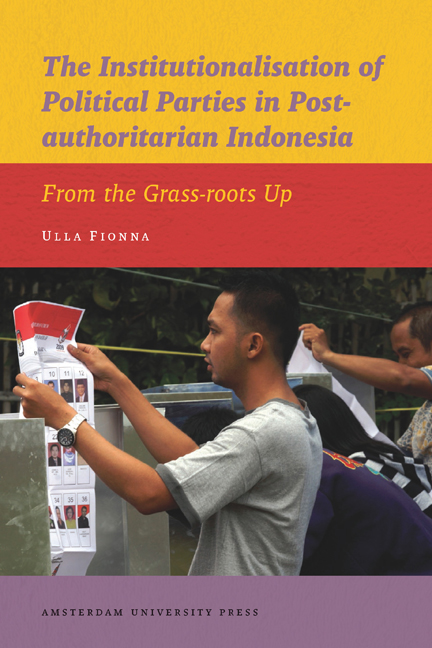 The Institutionalisation of Political Parties in Post-authoritarian Indonesia
The Institutionalisation of Political Parties in Post-authoritarian Indonesia Book contents
- Frontmatter
- Dedication
- Contents
- Preface
- Acknowledgements
- 1 The Question of Institutionalisation
- 2 Genesis of Modern Political Organisation in Indonesia
- 3 Diminishing Grass-roots Influence during the New Order
- 4 Party Organisation
- 5 Party Activities
- 6 Recruitment Approaches
- 7 Members’ Motivations and Participation in the Parties
- 8 Party Career and Intra-party Democracy
- 9 Progress of Party Institutionalisation and Its Role in Indonesia’s Democratisation
- Glossary
- Notes
- Bibliography
- Index
- Miscellaneous Endmatter
2 - Genesis of Modern Political Organisation in Indonesia
Published online by Cambridge University Press: 28 January 2021
- Frontmatter
- Dedication
- Contents
- Preface
- Acknowledgements
- 1 The Question of Institutionalisation
- 2 Genesis of Modern Political Organisation in Indonesia
- 3 Diminishing Grass-roots Influence during the New Order
- 4 Party Organisation
- 5 Party Activities
- 6 Recruitment Approaches
- 7 Members’ Motivations and Participation in the Parties
- 8 Party Career and Intra-party Democracy
- 9 Progress of Party Institutionalisation and Its Role in Indonesia’s Democratisation
- Glossary
- Notes
- Bibliography
- Index
- Miscellaneous Endmatter
Summary
Sukarno, Indonesia's first president, once remarked that Indonesian political parties ‘grew like weeds with shallow roots’ and were ‘interest top-heavy with petty-selfishness and vote-catching’ (1965: 265). From independence in 1945 until 1966, parties in Indonesia enjoyed postcolonial freedom. The early part of this period was characterised by dynamic political participation at the grass-roots level, and freedom for parties to pursue different ideologies. However, the period ended with political repression triggered by Sukarno's fear of parties’ growing power. This period of transition, known as Demokrasi Terpimpin (Guided Democracy), created the foundations for the political structures of the New Order (1966-1998).
Shiraishi (1990) has argued that Indonesia's early political parties grew out of the mass movement, or pergerakan, of the first few decades of the twentieth century. Sarekat Islam (Islamic Association, or SI), one of Indonesia's first political organisations, began as a trading association in Central Java in 1912, but established a political party in 1917. The Indies Social Democratic Association (Indische Sociaal-Democratische Vereniging, or ISDV), which underwent a number of name changes, eventually became the Partai Komunis Indonesia (Indonesian Communist Party, or PKI). It was established due to a close alliance and support of Dutch Socialists. Organisationally, the SI and ISDV already had many similarities with political parties, such as well-established membership and leadership structures and financial arrangements.
Aside from these movements, ethnically or regionally based organisations such as Young Java, Young Sumatran Union, Young Pasundan, Young Ambon, and Young Minahasa emerged in the 1910s with the aim of revitalising specific cultures (Reeve 1985: 2). Meanwhile, the religious group Muhammadiyah was founded in 1912 as a counterbalance against Dutch-initiated education and Christian missionaries (Reid 1974: 4). Conservative Muslims criticised Muhammadiyah for deviating from Indonesian Islam and adopting Western ways, however, and the more traditional Nahdatul Ulama (NU) was founded in 1926, as well as other less influential regionally based Islamic organisations (Reid 1974: 5). The mass nature of these organisations helped the parties they became establish strong membership bases.
Growing opposition to colonialism in the last few decades of the colonial period before Indonesia's 1945 independence created ideal conditions for the growth of political parties. Indonesia experienced tremendous growth in Western-style education in the 1920s (Reid 1974: 3), which, mixed with resentment of economic obligations such as paying taxes and rent in the midst of economic hardship, strengthened an awareness of class hierarchy.
- Type
- Chapter
- Information
- The Institutionalisation of Political Parties in Post-authoritarian IndonesiaFrom the Grass-roots Up, pp. 25 - 54Publisher: Amsterdam University PressPrint publication year: 2013


